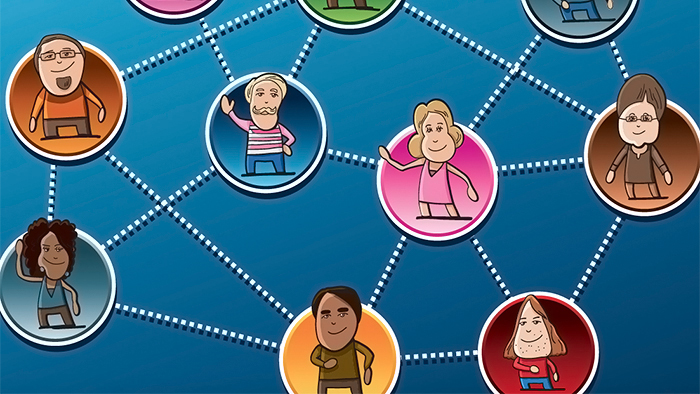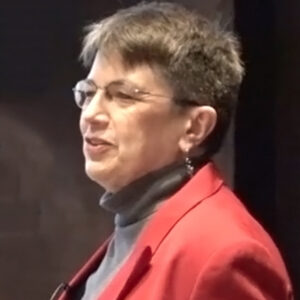
OADS to Sponsor Online Workshops to Support Community Relationships and Belonging
Source: Maine DHHS, Office of Aging and Disability Services’ flyer, Registration is open! Building Community Relationships, Valued Roles & Belonging with Angela Novak Amado, Ph.D.
The Maine Department of Health and Human Services, Office of Aging and Disability Services (OADS), is sponsoring an online series of two-hour workshops, Supporting Community Relationships, Valued Roles & Belonging, with Angela Novak Amado, Ph.D.
In fully inclusive communities, individuals with a disability label experience friendships and relationships with a wide variety of people and have valued social roles as community citizens. At the same time, community members have the opportunity to know, befriend, include, and value those who might otherwise be separated or marginalized. While many people agree with these values and the goal of full community participation, many agencies and staff struggle with “how to” support meaningful relationships with community members.
This online series of two-hour workshops will present stories, examples, and successful strategies learned in various projects across the country designed to support people with a disability label to have more friendships with ordinary citizens, be more fully part of their communities, and expand the number and types of valued social roles they experience.
These sessions are particularly designed for agencies providing community support, but the ideas presented will also be useful for residential support agencies, families, case managers, and others interested. All are welcome.
These sessions will incorporate and build upon the following free Friends manuals and Friends activity worksheets developed by Dr. Amado. There are two versions: one developed for use by professionals and paraprofessionals (2013); and one for use by families (2019).
Friends: Connecting People with Disabilities and Community Members (PDF) (2013)
Friends Activity Worksheets (PDF) (2013)
Friends: Connecting People with Disabilities with Community Members: A Manual for Families (PDF) (2019)
Friends for Family Members Activity Worksheets (PDF) (2019)
Participants will have actual and specific practice applying the material directly with people they support.
Please consider attending the entire series of two-hour sessions for various audiences. There will be a family-only session on May 5th.
There is no cost to attend, but pre-registration is required. A link to register is provided in each workshop description below. All sessions will be recorded, closed captioned and posted at the end of the Series. For registration support, please reach out to lisa.d.sturtevant@maine.gov. Certificates will be available for registered participants only.
About the Presenter
 Angela Novak Amado, Ph.D., worked at the University of Minnesota Institute on Community Integration, Minnesota’s federally designated University Center for Excellence in Developmental Disabilities (UCEDD), for more than 30 years before her retirement. Angela has researched, taught and consulted on the topics of friendship and community relationship-building, with organizations and families throughout the U.S., Europe, and Australia.
Angela Novak Amado, Ph.D., worked at the University of Minnesota Institute on Community Integration, Minnesota’s federally designated University Center for Excellence in Developmental Disabilities (UCEDD), for more than 30 years before her retirement. Angela has researched, taught and consulted on the topics of friendship and community relationship-building, with organizations and families throughout the U.S., Europe, and Australia.
I. The Importance of Relationships with Community Members: An Introduction to the Overall Approach
Wednesday, April 28, 2021: 10:00 A.M. to 12:00 P.M.
Register here for the introductory session.
Of interest to the following audiences: Direct Support Professionals, Families, Managers/Supervisors, Executives, Case Managers, Guardians, Board Members, Individuals Who Receive Support, Community Members and Advocates, etc.
In this two-hour introductory session, the importance of community relationships and basic approaches toward community connecting will be presented. This session is intended for a wide audience.
II. Planning – What to do to Support Community Connections and Relationships
Wednesday, May 5, 2021: 10:00 A.M. to 12:00 P.M.
Of interest to the following audiences: Direct Support Professionals, and their Managers from Community Support Agencies/Staff, Residential Agency Staff, Advocates, Guardians, Case Managers/Care Coordinators, and other interested individuals.
This session will present three main areas of “how-to” strategies:
- Successful strategies in planning, connecting, and supporting individuals in having more friendships and community involvement.
- How to expand the variety and types of social roles of people who receive services.
- The role of staff as “community connectors.”
This session is aimed at practical application of the strategies. People who attend will leave with concrete ideas to try out for a specific individual who receives services. We will have you try out some of the ideas and then come back to share and learn together.
Wednesday May 5, 2021: 3:00 P.M. to 4:30 P.M.
Family (ONLY) Session: “How-to” strategies for family members to support relationships between their family members with disabilities and other community members will be presented. Material will be drawn from a project with family members and a manual developed specifically for family members. The manual describes why it is important to promote such friendships, community belonging and membership. Included in this session will be examples of specific exercises to guide users in creating a plan for connecting people. This session is designed for family members, but the material can also be used by support coordinators, teachers, staff, and people with disabilities to support community relationships.
III. Follow Up on Community Connecting Actions – Community of Practice
Wednesday, June 2, 2021: 10:00 A.M. to 12:00 P.M.
Of interest to the following audiences: People who attended the May 5 Session II on Planning: Direct Support Professionals, and their Managers, from Community Support Agencies/Staff, Residential Agency Staff, Advocates, Guardians, Case Managers/Care Coordinators, and other interested individuals.
This session is for people who attended the previous “planning” session (II) on the morning of May 5th. Participants will share what ideas they had in the planning session, what they tried or did not have the opportunity to try. We will identify the sources of any success, and the barriers that were encountered in pursuing ideas.
We will also engage in additional exercises about supporting community members to get to know and befriend individuals who receive support. There will be practice about introducing people, making requests of community members, and the next steps to deepen acquaintances and relationships.
IV. Using the Friends Manual
Wednesday June 9, 2021: 10:00 A.M. to 12:00 P.M.
REGISTER HERE for Using the Friends Manual – the three-part series – May 5; June 2; and June 9.
Of interest to the following audiences: Direct Support Professionals, Managers, Supervisors and Executives who have attended previous Sessions I, or II and III.
Those who participated in the previous planning and follow-up sessions will have the opportunity to do the following:
- Review the brain-storming ideas and results from Sessions II and III.
- Identify the material in the Friends manuals and Friends Activity Worksheets, that is applicable and can be used in the future to support community building.
- Identify and apply the ideas in the Friends manual about how to address barriers or problems when they are encountered.
- Identify the needed agency structures which support and enhance more relationship-building, community connectedness, and valued social roles for the people served.
- Build upon the ideas in the Friends manual to enlist wider community engagement and support.
V. Organizational Support
Wednesday, June 16, 2021: 10:00 A.M. to 12:00 P.M.
Register here for the session on organizational support.
Of interest to the following audiences: Supervisors/Managers, Executives and Board Members.
Being an agency that supports authentic community relationships and belonging means both short-term and long-term shifts in internal and external organizational structures. This session is for those with direct and indirect roles in designing and implementing needed structures to realize the goals that: (1) all individuals who receive support have meaningful community relationships; and (2) community members have the opportunity to know, befriend and include citizens with disability labels.
This session will address the following:
- What organizational/structural changes are needed to support more community relationships.
- Examples of how other agencies have implemented these ideas.
- Identification of rule and/or policy changes needed to fully realize community belonging.
- What supports direct support staff need.
- What supports managers/supervisors need.
- Ideas to enhance the role of community members in building inclusive communities.
Participants will leave with concrete ideas for organizational structures needed to implement these approaches in the short and long terms.
Photo credits:
Screenshot of Angela Novak Amado courtesy of the video, History of Person Centered Practices with Angela Amado, Institute on Community Integration (YouTube).
Featured image of people in circles connected by dots is courtesy of the manual cover for Friends: Connecting People with Disabilities and Community Members (2013).
